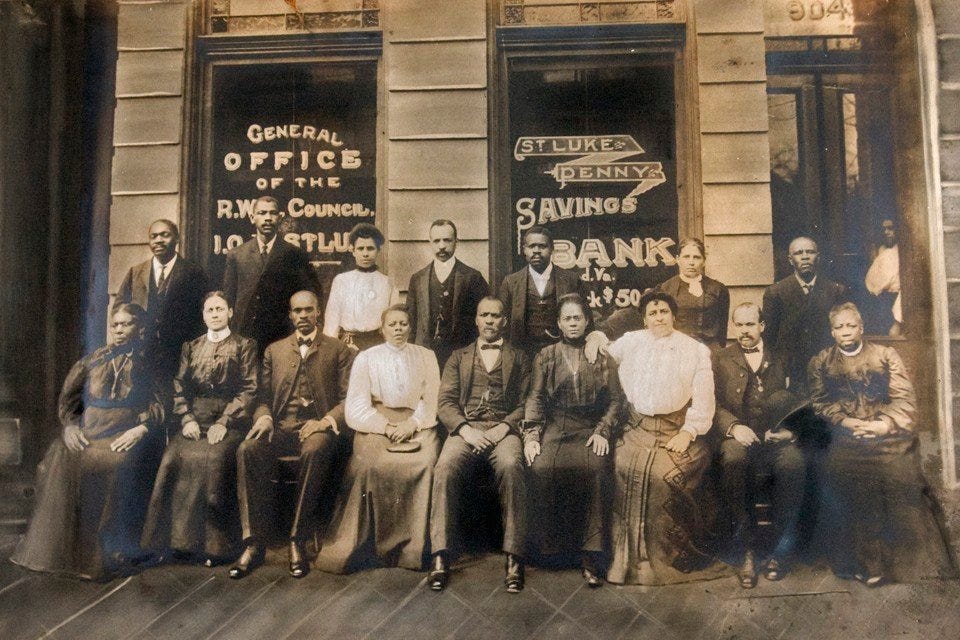The Rebirth of Fraternal Individualism
The place where compassion meets self-reliance is sacred. From Los Angeles to Western North Carolina, we need to replace dependence on distant bureaucrats with better preparedness and mutualism.

One might argue that too many of us are keeping up with the Joneses by working 40-plus hours a week to keep some corporation or other profitable. This leaves less time for the practice of compassion beyond feeding the hungry mouths of the nuclear family.
There is a grain of truth in this.
Yet people find time for all manner of activities, from Ashtanga yoga to political canvassing, video gaming to Zen meditation. Most of these activities are supposed to quell the anxieties of modern life.
We'll return to the question of what a renaissance in mutual aid might look like in the twenty-first century. For now, it's enough to urge that if the federal government's financial collapse is imminent, we will have no choice but to reconstitute the mutual aid and civil society sector. The silver lining is that we can revive our shriveled souls and restore our moral balance.
We will welcome the return of "fraternal individualism."
"If self-reliance and thrift were fraternal watchwords," writes historian David Beito, "so too was individualism. The word did not entail Epicurean self-gratification or Emersonian contrariness; instead, it was akin to a winnowing out process for the improvement of character."
In every case Beito studied, the goal for each mutual aid society member was economic self-reliance. Leaders were artful directors and cooperators. Everyone had to exercise self-discipline, which was not primarily selfish. That's why the all-black United Order of True Reformers official held two views without contraction. He thought "selfish individualism" and "intemperance" should be shunned, but he also supported a program that enabled "people to get homes and means upon which they may independently subsist."
The place where compassion meets self-reliance is sacred.
That's why the mutual aid era was about doing what you could to help others in your community while helping them become self-reliant. None of this is an argument against aiding people in distress worldwide. By all means, we should fight malaria and help distant peoples access clean drinking water. But we should return more of our attention and resources to those nearby. Sometimes, advice, encouragement, and mentorship are more valuable than money.
To practice compassion is to create a functional role for oneself.
We can imagine the True Reformer looking a fellow member in the eyes to offer him help with a sick child. We can imagine the True Reformer looking back to take it, clasping the man's hand, vowing to help cook for the other men as thanks. These are neither the distant abstractions of Washington bureaucrats nor the Welfare State's means tests, statistics, and plot points—all of which can only stand in for the thinking, feeling, and actions of flesh-and-blood people.
People bound in mutual aid make real commitments to each other, and broken commitments are felt. This is no abstract "social contract" but real promises people make to each other. Practitioners assume nearly everyone is capable of community stewardship and personal transformation.
It does not treat great swaths of humanity like liabilities to be managed, the target of federal budget outlays.
Today, the sum of one's moral commitments is to dabble in online activism until the day comes to send one's prayers up in the voting booth. But people have forgotten how to be Barn Raisers. They have also lost the knowledge and discernment to be better community members.
We have become a people enchanted by controversies far, far away.
And we must remember how to help.





this wonderful mentality has many historic roots. perhaps chief among them is what we might call 'ontological anthropology'...who IS Man? is he at root a happenstance of random biological & chemical/electrical processes? OR...is he the most rational & sentient being of God"s creation, "endowed with inalienable Rights..." (as Franklin and the founders woulda argued)???
modern man tries to have it both ways...from opposite sides of his mouth.
but Nietzsche well knew that If God is in fact dead...then so is Man (Humanity) as we have known him...& it drove him Mad. the root of man, in the image of God...flowers a culture of the "scared" unknown to bio-chemical electro happenstance